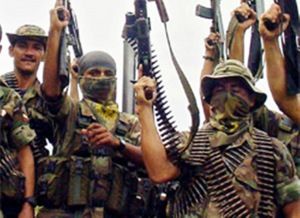
Publisher:
Bonnie King
CONTACT:
Newsroom@Salem-news.com
Advertising:
Adsales@Salem-news.com

~Truth~
~Justice~
~Peace~
TJP
May-05-2011 20:39

 TweetFollow @OregonNews
TweetFollow @OregonNews
Re-Demobilized Colombian Paramilitaries to Sign Free Trade Agreement with U.S.
Belén Fernandez Salem-News.comColombia's emerging realities...
 (Photo: EFRAIN PATINO/AFP/Getty Images) |
(BOGOTA, Colombia) - Two years ago, my friend Amelia and I hitchhiked from Ecuador through Colombia to Venezuela and back over a period of four months. The Colombian portions of the excursion acquainted us with various complaints regarding the behavior of the country’s paramilitary formations, which had allegedly demobilized in accordance with then-President Álvaro Uribe’s Justice and Peace Law of 2005 but had in fact simply been reincarnated under different labels. The Autodefensas Unidas de Colombia (United Self-Defense Forces of Colombia, AUC)—formerly the dominant paramilitary umbrella group—has, for example, been justly and peacefully superseded by organizations like the Águilas Negras (Black Eagles), which perform similar functions with an enhanced focus on controlling the drug trade. Human Rights Watch notes in its 2008 report on Colombia:
"While more than 30,000 [paramilitaries] supposedly demobilized, Colombian prosecutors have turned up evidence that many of them were not paramilitaries at all, but rather, civilians recruited to pose as paramilitaries. Law enforcement authorities never investigated most of them.”
Hitchhiking through the southern Colombian department of Putumayo, Amelia and I learned from residents that the Águilas Negras were distributing fliers in certain towns threatening to kill extraneous sectors of society, including persons who emerged from their homes after 10 p.m. In the northern department of Antioquia, homeland of Uribe, we were told by inhabitants of the peace community of San José de Apartadó in the banana-growing region of Urabá—where assassinations have been historically facilitated by the presence of the AUC on the payroll of Chiquita Brands International—of continuing paramilitary threats against their lives and livelihoods.
Hitchhiking through the southern Colombian department of Putumayo, Amelia and I learned from residents that the Águilas Negras were distributing fliers in certain towns threatening to kill extraneous sectors of society, including persons who emerged from their homes after 10 p.m. In the northern department of Antioquia, homeland of Uribe, we were told by inhabitants of the peace community of San José de Apartadó in the banana-growing region of Urabá—where assassinations have been historically facilitated by the presence of the AUC on the payroll of Chiquita Brands International—of continuing paramilitary threats against their lives and livelihoods.
Reports on paramilitary conduct in other areas meanwhile included the observation by a 22-year-old truck driver who picked us up hitchhiking in the southwestern Colombian department of Cauca that the FARC were at least more predisposed to politeness and financial reimbursement when it came to making demands on the food supplies in his village. As for the ex-army officer who picked us up near Medellín and drove us past Hacienda Nápoles, the former estate of late Medellín cartel kingpin Pablo Escobar that was subsequently converted into a national prison-slash-theme park with hippopotamuses, he declared that he himself had just completed a jail stint due to previous ownership of a small airplane that was found (after he sold it, he claimed) to be transporting drugs. The ex-officer complained that neither Uribe’s history of narcotrafficking ties—summarized in a 1991 report by the U.S. Defense Intelligence Agency that describes then-senator Uribe as “dedicated to collaboration with the Medellín cartel at high government levels” and “a close personal friend of Pablo Escobar”—nor his founding and sponsorship of paramilitary groups had warranted similar punishment. (Acquired by Georgetown University’s foreign service school in 2010 as a “distinguished scholar,” Uribe will be demobilized at the end of the current semester.)
Amelia and I were frequently informed by wealthier motorists who gave us rides that we should thank Uribe’s policy of seguridad democrática—“democratic security”—for our ability to cross the country by car without being kidnapped by the FARC. No concern was exhibited for the lack of security enjoyed by portions of the Colombian demos such as indigenous groups terrorized and displaced on behalf of non-portions of the demos such as multinational palm oil corporations; Uribe’s success in clearing the roadways of the FARC was meanwhile apparently not matched by success in clearing them of the female-inclusive assault teams that drivers informed us were the reason that, even when Amelia and I employed ordinarily surefire tactics for getting a ride such as placing ourselves in the middle of the road at police checkpoints with a sign reading “STOP”, 18-wheelers continued to careen around us.
I am currently in Colombia once again, this time with my mother, who was not initially persuaded by my arguments concerning the joys of hitchhiking but who, after walking 20 kilometers in the sun along the road from San Gil in the department of Santander to the village of Barichara, reasoned that being inside vehicles rather than alongside them might produce fewer opportunities for disaster. In the end, hitchhiking also produced free accommodations in the hills outside Barichara for several days at the house of a husband and wife who picked us up, after which walking was limited to the 20 minutes of dirt road that led from the house to the village.
On Easter morning my mom and I fell into step with two campesinos, on their way to mass, who launched into a history of the town. It was built by the Spaniards, they said. No, they corrected themselves, it was built by the Indians who were told by the Spaniards what to build.
"Moving on to more modern forms of imperial instruction, the campesinos offered their version of the U.S.-Colombia Free Trade Agreement (FTA), implementation of which has been stalled since 2006 (but is now moving forward): The U.S. will send things it doesn’t need to Colombia, they explained, and we will send things we don’t need to the U.S. There will be no taxes.
As Jim Lobe and Aprille Muscara note in a recent article for Inter Press Service, however, there are other obstacles to “free trade” between the U.S. and Colombia aside from taxes:
Indeed, more trade unionists have been assassinated in Colombia in the past 20 years than in the rest of the world combined. Given U.S. knowledge of such details—plus other aspects of reality, such as the ongoing parapolitics scandal revealing numerous links between paramilitaries and pro-Uribe politicians and family members, or the false positives scandal revealing the soldierly habit of murdering civilians and then dressing them up in FARC attire in order to earn bonus pay and extra vacation time—it is not clear how U.S. Secretary of State Hillary Clinton managed to recently comment, regarding the tail end of the Uribe presidency, that Colombia “had gone from a source of danger to itself and others to a source of inspiration to all of us and to becoming a vital partner in the great debates of our time.” U.S. Defense Secretary Robert Gates offered similarly fantastic rhetoric last year when he held Colombia up as a pioneer in regional security:
"Colombia’s success against terrorists and narco-traffickers does offer a lot of opportunities for them to share their expertise. We certainly would like to see . . . other countries take advantage of Colombia’s strengths.”
When we reached the center of Barichara, the campesinos veered toward the church and my mom and I bought a copy of the day’s El Espectador, which contained a report on the WikiLeaks release of cables from the U.S. Embassy in Bogotá confirming awareness of complaints that palm oil producers had contracted paramilitaries to illegally displace Afro-Colombian communities from their land in the department of Chocó. Of course, the palm oil-paramilitary team-up was already publicized in the mainstream media years ago, as was Uribe’s role in promoting the crop as a biofuel.
More blatant U.S. contributions to the equation are meanwhile highlighted in Kevin Young’s January 2011 piece for AlterNet, in which he writes the following about Plan Colombia, the monstrous U.S. military aid package to Colombia ostensibly intended to combat drug trafficking:
"The Colombian state is also closely linked to the people and activities that Plan Colombia alleges to be targeting, a reality understood by the U.S. government long before Plan Colombia started. The United States is deeply implicated in enabling this relationship, for example through USAID’s ‘alternative development’ programs in non-traditional agricultural products, such as African palm oil. Colombian Senator Gustavo Petro notes that ‘Plan Colombia is fighting against drugs militarily at the same time it gives money to support palm, which is used by paramilitary mafias to launder money,’ so in effect the U.S. government is ‘subsidizing drug traffickers.’”
Perhaps concerns can be assuaged via a paramilitary re-demobilization.
 |
 Belén is co-editor at Pulse Media. Her articles also have appeared in CounterPunch, Narco News, Palestine Chronicle, Palestine Think Tank, Rebelión, Tlaxcala, The Electronic Intifada, Upside Down World, and Venezuelanalysis.com. Her book “Coffee with Hezbollah,” a humorous political travelogue chronicling her hitchhiking trip through Lebanon in the aftermath of the 2006 Israeli assault, is available at Amazon, Amazon UK, and Barnes and Noble.
Belén is co-editor at Pulse Media. Her articles also have appeared in CounterPunch, Narco News, Palestine Chronicle, Palestine Think Tank, Rebelión, Tlaxcala, The Electronic Intifada, Upside Down World, and Venezuelanalysis.com. Her book “Coffee with Hezbollah,” a humorous political travelogue chronicling her hitchhiking trip through Lebanon in the aftermath of the 2006 Israeli assault, is available at Amazon, Amazon UK, and Barnes and Noble.
Born in Washington, DC, in 1982, Belén earned her bachelor's degree with a concentration in political science from Columbia University in New York City. Her diverse background of worldwide experiences, created a fantastic writer; one whose work we are extremely happy to share with Salem-News.com viewers. You can contact Belén at: belengarciabernal@gmail.com
Articles for May 4, 2011 | Articles for May 5, 2011 | Articles for May 6, 2011

Salem-News.com:
googlec507860f6901db00.html



Terms of Service | Privacy Policy
All comments and messages are approved by people and self promotional links or unacceptable comments are denied.
[Return to Top]
©2025 Salem-News.com. All opinions expressed in this article are those of the author and do not necessarily reflect those of Salem-News.com.